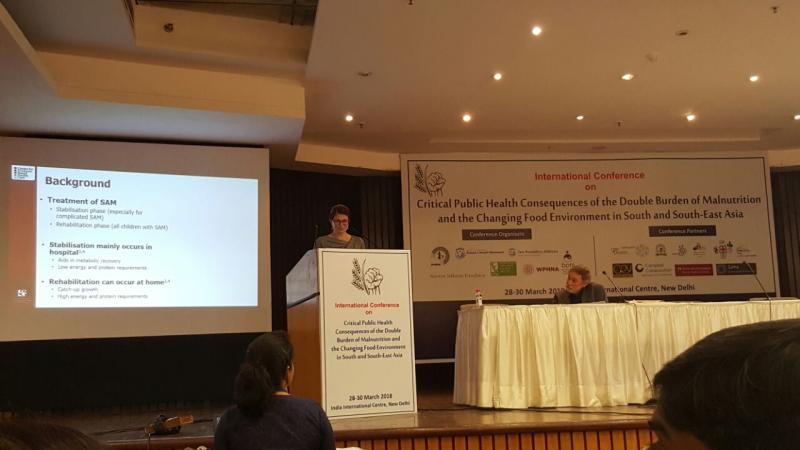A warm welcome to Cochrane Nutrition’s first newsletter. Cochrane Nutrition is a Cochrane group called a Field and we represent the interests of evidence-based nutrition. In agriculture, fields are spaces where people grow food. In informatics, fields are spaces that hold information. In Cochrane, Fields are groups of people who work together to put evidence into practice in a dimension of health care other than a specific health care problem or body system. Cochrane exists so that healthcare decisions get better and we work to connect the evidence produced by Cochrane Review Groups with the practitioners and policy makers who need it to inform their decisions. The word "Field" is a good one because it suggests growth, information and vigorous engagement.
Cochrane Nutrition was formally established in August 2016. The field is based in South Africa, jointly hosted by Cochrane South Africa at the South African Medical Research Council, and the Centre for Evidence-based Health Care at Stellenbosch University. Read more about the impetus to establish Cochrane Nutrition here http://www.cochranelibrary.com/editorial/10.1002/14651858.ED000118
Since inception, contributors to Cochrane Nutrition have begun strengthening existing networks and partnerships both within Cochrane and with partners outside of Cochrane. We are engaging in various activities that address our primary objectives, which are to:
- increase the coverage, quality, and relevance of Cochrane nutrition reviews,
- increase the impact of Cochrane nutrition reviews across all stakeholders,
- contribute to strengthening methods for conducting Cochrane nutrition reviews, and
- ensure the sustainability of Cochrane Nutrition
We’d like to share a few of our key activities with you.
Getting priority reviews done
Cochrane Nutrition is working to facilitate the production of Cochrane nutrition reviews that are relevant. To do this we are engaging in various priority-setting processes with users of Cochrane reviews, such as guideline developers, and with producers of reviews in various Cochrane Networks and Review Groups. In April 2017, we convened a stakeholder consultation in Geneva, Switzerland on priorities for nutrition evidence synthesis. The half-day consultation was attended by 20 representatives from various stakeholder groups within Cochrane and the World Health Organization interested and working in nutrition evidence synthesis. Further work will include engaging with Cochrane Networks and Review Groups to get reviews addressing these identified priorities done, and continue engaging with stakeholders at multiple levels to expand the list of priorities for dissemination and new review topics.
Getting Cochrane nutrition reviews used
Cochrane reviews provide reliable synthesized nutrition evidence and have been used extensively to inform policy and practice. Cochrane Nutrition is engaging to strengthen the use and thus impact of Cochrane reviews in nutrition policy and practice. We are producing and disseminating various products that summarise Cochrane nutrition evidence for users. For example, we have engaged with stakeholders in the disaster risk and humanitarian emergencies sector to scope synthesised evidence on prevention and management of severe acute malnutrition and moderate acute malnutrition in humanitarian emergencies and develop a collection of reviews on this topic.
We have worked to build awareness in the nutrition community about Cochrane reviews and evidence-informed decision-making, through training and workshops at congresses. Examples of workshops include applying systematic reviews in evidence-informed public health nutrition guideline development at World Nutrition 2016 and evidence-informed nutrition: getting the evidence right at the National Nutrition Congress.
We hope you enjoy reading this newsletter. We will continue working toward achieving Cochrane Nutrition’s objectives, and Cochrane’s vision of a world of improved health where decisions about health and health care are informed by high-quality, relevant and up-to-date synthesized research evidence. We welcome your engagement and contributions on this journey. Please contact us with suggestions, projects and activities: /contact-us - or sign up to be contacted to participate in activities to further these objectives: /get-involved
Celeste Naude & Solange Durão
Co-Directors: Cochrane Nutrition
New nutrition reviews in Cochrane Library
 |
Health education and complementary feeding practices: What is the evidence? - see blogshot here
Read more about the review here |
 |
Benefits of school programmes that encourage healthier child weight - see blogshot here
Read more about the review here |
 |
Calcium supplements for preventing pregnancy complications - see blogshot here
Read more about the review here |
Health benefits of dietary changes in chronic kidney disease
People who have chronic kidney disease can experience a lower life expectancy and complications, including heart disease, This review highlights the uncertainty of the evidence for any health benefits of dietary changes in people with chronic kidney disease who receive dialysis treatment or a kidney transplant.
Read more
Strategies to support school-based policies aimed at changing student health behaviours
A number of school-based policies or practices can improve student health behaviours such as diet, physical activity, preventing excessive weight gain, tobacco or harmful alcohol use. Despite this, these policies and practices are often not implemented in schools. This review reports on strategies that may support the implementation of these policies and practices.
Read more
Nutrition Evidence in Action
Systematic reviews (SRs) are important tools for evidence-informed guideline development. Guidelines, developed by organisations and agencies to improve health care and outcomes, contain recommendations for clinical or public health practice or policy. Recommendations are intended to assist providers and recipients of health care and other stakeholders to make informed decisions by providing information about what should or could be done.
Evidence-informed guideline development methods aim to ensure that guidelines are free from bias and meet a health need. Recommendations in guidelines should be based on a systematic, comprehensive, objective assessment of the balance of totality of evidence on potential benefits and harms and explicit consideration of other relevant factors. In this newsletter we highlight two recent guidelines, on heart disease and breastfeeding, where Cochrane nutrition reviews have informed recommendations.
The guideline contains eight recommendations on diet. Five of these recommendations were informed in part by Cochrane systematic reviews on nutrition. See which reviews informed the recommendations below.
SIGN (Scottish Intercollegiate Guideline Network) guideline on Risk estimation and the prevention of cardiovascular disease - read the full guideline here
| Recommendation on total and saturated fat | Reduced or modified dietary fat for preventing cardiovascular disease | Read full review |
| Recommendation on reducing dietary salts | Advice to reduce dietary salt for prevention of cardiovascular disease | Read full review |
| Effects of low sodium diet versus high sodium diet on blood pressure, renin, aldosterone, catecholamines, cholesterol, and triglyceride | Read full review | |
| Recommendation on folate supplementation | Homocysteine-lowering interventions for preventing cardiovascular events | Read full review |
| Recommendation on dietary patterns | “Mediterranean” dietary pattern for the primary prevention of cardiovascular disease | Read full review |
| Recommendation on weight reduction | Long-term effects of weight-reducing diets in people with hypertension | Read full review |
WHO guideline on Protecting, promoting and supporting breastfeeding in facilities providing maternity and newborn services - read the full guideline here
This guideline contains 15 global recommendations on protection, promotion and support of optimal breastfeeding in health care facilities, 13 of which were informed in part by Cochrane systematic reviews on nutrition (published by Cochrane Pregnancy and Childbirth and Cochrane Neonatal)
| Recommendations on Immediate support to initiate and establish breastfeeding | Early skin-to-skin contact | Early skin-to-skin contact for mothers and their healthy newborn infants | Read full review |
| Kangaroo mother care to reduce morbidity and mortality in low birth weight infants | Read full review | ||
| Showing mothers how to breastfeed | Support for healthy breastfeeding mothers with healthy term babies | Read full review | |
| Instruments for assessing readiness to commence suck feeds in preterm infants: effects on time to establish full oral feeding and duration of hospitalisation | Read full review | ||
| Methods of milk expression for lactating women | Read full review | ||
| Rooming in | Rooming-in for new mother and infant versus separate care for increasing the duration of breastfeeding | Read full review | |
| Avoidance of feeding bottles and teats | Cup feeding versus other forms of supplemental enteral feeding for newborn infants unable to fully breastfeed. | Read full review | |
| Avoidance of bottles during the establishment of breast feeds in preterm infants | Read full review | ||
| Demand feeding | Baby-led compared with scheduled (or mixed) breastfeeding for successful breastfeeding | Read full review | |
| Responsive versus scheduled feeding for preterm infants | Read full review | ||
| Recommendations on Feeding practices and additional needs of infants | Early additional foods or fluids | Early additional food and fluids for healthy breastfed full-term infants | Read full review |
| Avoidance of pacifiers or dummies | Effect of restricted pacifier use in breastfeeding term infants for increasing duration of breastfeeding | Read full review | |
| Non-nutritive sucking for increasing physiologic stability and nutrition in preterm infants | Read full review | ||
| Oral stimulation for promoting oral feeding in preterm infants | Read full review | ||
| Recommendations on creating an enabling environment | Antenatal breastfeeding education for mothers | Antenatal breastfeeding education for increasing breastfeeding duration | Read full review |
| Interventions for promoting the initiation of breastfeeding | Read full review |
News & upcoming conferences
 |
Presentation of Cochrane review on RUTFAnel Schoonees of the Centre for Evidence Based Health care attended the NutriConference18 in New Delhi, India from 24 March to 1 April 2018. She shared findings of the Cochrane review on the effects of home-based ready-to-use therapeutic food (RUTF) for the nutritional rehabilitation of young children with severe acute malnutrition.
|
Webinar
1. G-I-N Conference 11-14 September 2018 - read more
2. Cochrane Colloquium 16-18 September 2018 - read more
Please join us at the Cochrane Nutrition community meeting on Monday, 17 September 2018 from 07:30 to 08:45
3. 7th Annual ISEHC Conference 1-3 November 2018 - read more
Publications
Nutrition guideline development by WHO
The World Health Organization (WHO) Department of Nutrition for Health and Development (NHD) develops evidence-informed guidance on effective actions to address all forms of malnutrition; establishes standards and harmonizes methodologies; and increases public awareness about the WHO policy recommendations. WHO has recently released a document that outlines their continuous quality improvements. This document includes information about the work conducted with Cochrane, including producing or updating systematic reviews for guidelines, training, and providing access to selected reviews. Various Cochrane Review Groups, as well as Cochrane Nutrition continue to contribute to this successful collaboration.
Read more
Strengthening the Reporting of Observational Studies in Epidemiology - Nutritional Epidemiology (STROBE-nut): An Extension of the STROBE Statement
Strobe Nut is a guideline that helps researchers report findings of nutritional epidemiological studies. Strobe stands for Strengthening the Reporting of Observational Studies in Epidemiology and Nut indicates that this is an extension for nutritional epidemiology:
Read more
